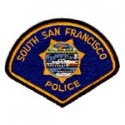
Starting on January 1st, 2014, law enforcement agencies across the State of California began specific tracking of DUI arrests where the drivers were under the influence of drugs or a combination of drugs and alcohol. New sections were added to the California Vehicle Code to be able to keep track of these statistics. To date this year, South San Francisco Police officers have arrested 18 people for driving while under the influence of drugs or the combination of alcohol and drugs. This is separate from the over 60 drivers arrested this year for driving under the influence of alcohol alone.
The South San Francisco Police Department has a zero-tolerance approached to drugged driving. The Department has dozens of specially-trained officers that can identify drug- impaired drivers. Drivers are reminded that driving while under the influence of any drug (prescription, over-the counter, legal,or illegal) is against the law; if the drug impairs your ability to safely drive a car, then you are subject to arrest, fines, and incarceration.
A recent study conducted by Health Day News showed that fatality crashes involving marijuana use has tripled during the last decade. The study was completed by researchers from Columbia University’s Mailman School of Public Health. Dr. GuohuaLi, co-author of the report stated,”If this trend continues, in five or six years non-alcohol drugs will over take alcohol to become the most common substance involved in deaths related to impaired driving”. This study is fueling concerns about the increased use of medical marijuana and attempts to legalize marijuana in California and other states.
In addition to the especially-trained officers patrolling the streets looking for alcohol and drug impaired drivers, the South San Francisco Police Department is continuing its commitment to working with the Department of Motor Vehicles (DMV) on its “DUI Hot List” program. This is a program that identifies the “worst of the worst” repeat DUI offenders with multiple DUI convictions and suspended drivers licenses. DMV provides this information to the police department, where additional information is developed about the drivers. This information is then provided to patrol and traffic officers who use the list to conduct spot checks and surveillance operations watching the homes and work places of these drivers. If the any of the subjects on the “Hot List” are found to be driving, then they are subject to arrest and incarceration.
Funding for some of these traffic safety programs is provided by a grant from the California Office of Traffic Safety through the National Highway Traffic Safety Administration.